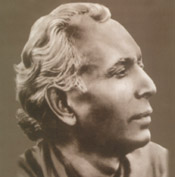'Establish Anagarika Dharmapala Award'
by Senaka Weeraratne, Asian Tribune, October 12, 2007
Colombo, Sri Lanka -- Whatever crisis Sri Lanka finds itself at this juncture in its history, this country's repute in the international arena would improve if an award in the name of an outstanding Sri Lankan were to be inaugurated in Sri Lanka along the lines of the Nobel Prize, Mahatma Gandhi Peace Prize or Ramon Magsaysay Award.
 << Anagarika Dharmapala (1864-1933)
<< Anagarika Dharmapala (1864-1933)
The case in favour of establishing such an Award is strong. One advantage in sponsoring an International Prize is the opportunity it provides for influencing people and promoting particular values that the host country would like to be publicly associated with. For example, both Norway and Sweden are relatively small countries. Yet, they wield considerable influence internationally, among other things, by being associated with the selection process of the Nobel Prize (particularly the Nobel Peace Prize) and the conduct of peace initiatives in various parts of the world.
Although the Ramon Magsaysay Award of the Philippines was granted Sri Lanka's Sarvodaya Leader A.T. Ariyaratane in 1968 and Music Maestro Pandit W.D. Amaradeva in 2001 bringing honour to Sri Lanka, it also drew attention to a glaring deficiency in this country's national scheme of distribution of awards i.e. the lack of a comparable International Prize in the name of an outstanding Sri Lankan, whose work most benefited humanity.
We have a range of choices in respect to the selection of a name for the proposed Award. One of Sri Lanka 's great claims to international recognition has been the leading role it has played in the Buddhist world. Anagarika Dharmapala (1864-1933) towers over any other figure in the past century for his pioneering contributions towards the revival of Buddhism in Sri Lanka and India, and the spread of Buddhism in the West. Dr. Martin Baumann, a noted German Scholar on Buddhism in the West, refers to Anagarika Dharmapala as ' the first global Buddhist missionary and the Maha Bodhi Society the first inter- or transnational Buddhist organization '. The inauguration of an International Prize under the name ' Anagarika Dharmapala Award for Promoting Buddhist Values in the Modern World ' or alternatively (if this title sounds restrictive) an 'Anagarika Dharmapala Peace Prize' merits serious consideration.
The late Prime Minister Mrs. Sirima Bandaranaike (1916-2000) has a strong claim to be honoured through an International Award founded in her name. Women particularly in Third World countries find inspiration in Mrs. Bandaranaike becoming the World's first woman Prime Minister and in turn demonstrating to the rest of the world that a woman can lead a nation upon assuming power through a democratic election. This is no mean achievement.
Dr. Ananda Coomaraswamy (1877-1947), internationally acclaimed Art Historian and Philosopher, is a towering figure whose work particularly towards generating a better appreciation of Eastern Art and Culture deserves to be recognised by way of establishing an International Award for Cultural Understanding in his name.
The defining feature of the 20th century in political terms is the collapse of colonialism and the retreat of the West after nearly 500 years of military occupation of many Asian and African countries. Yet the Nobel Peace Prize Committee was not prepared to view the freedom fighters from Asia and Africa, who combined their advocacy of human rights with calls for freedom from Western colonial rule as suitable candidates for the Nobel Peace Prize. The few Asians who have been granted this Award ( e.g. Dalai Lama and Aung San Suu Kyi, are those who continue to challenge and embarrass Governments in Asian Countries that do not have pro-western leanings such as China and Myanmar.
Mahatma Gandhi, the universally recognised apostle of Peace and Ahimsa (non-violence) of the 20th Century, was denied the Nobel Peace Prize for the simple reason that the Nobel Peace Prize Committee did not wish to embarrass the British colonial rulers.
Third World countries may find guidance in the practice adopted by the Jewish immigrants in North America . When they found that they were being sidelined for coveted prizes by the ruling Anglo-Saxon elite in USA , the Jewish leaders created their own system of Awards. They started giving prizes to themselves and others. The famed Oscar awards to the film industry, in an example of Jewish creativity to overcome racial bias against them.
The proposed Award it is hoped would to some extent redress the inequities inherent in the scheme of International Awards emanating from Western countries. The Nobel Prize, in particular has a distinct Euro-centric bias. Alfred Nobel, a Swedish industrialist, donated a part of his great fortune (earned from manufacturing and selling Dynamite which he invented, and gun - running in various theatres of war) towards establishing the Nobel Prize for the purpose of rewarding human ingenuity in several specified fields. The overwhelming majority of recipients however have been European.
The time has come for Third World countries to take a critical look at the fairness in the selection process of choosing candidates for International Awards originating in the West.
Their self-respect and dignity would be preserved if the Third World were to lobby a neutral International Agency such as the UN to inaugurate a premier scheme of International Awards.

 << Anagarika Dharmapala (1864-1933)
<< Anagarika Dharmapala (1864-1933)